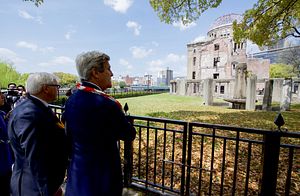This weekend, John Kerry became the first U.S. secretary of state to visit Hiroshima, which suffered from the world’s first atomic bombing when a U.S. B-29 Superfortress dropped the “Little Boy” bomb on August 6, 1945. Kerry, along with his counterparts in attendance at the G7 Foreign Ministers’ Meeting in Hiroshima, visited the Peace Memorial Museum commemorating the bombing and its aftermath.
Kerry is the latest of a growing list of U.S. officials to have visited Hiroshima, including then-Speaker of the House Nancy Pelosi, who went in 2008, as well as current Ambassador to Japan Caroline Kennedy and her predecessor, John Roos. Kerry was the first sitting cabinet-level official to make the trip.
In remarks to the press afterwards, Kerry called the museum “extraordinary,” “stunning,” and “gut-wrenching,” saying it was “a display I will personally never forget.”
“It tugs at all of your sensibilities as a human being. It reminds everybody of the extraordinary complexity of choices in war and of what war does to people, to communities, to countries, to the world,” Kerry said.
Yet he added that “the reason we came here was not to be stuck in the past. We came here and drew from the experience of touring in this museum how critical it is that we all apply the lessons of the past to the future and the present… war must never be the first resort.”
In particular, the State Department has framed Kerry’s visit to the Hiroshima memorials with the other G7 foreign ministers in the context of his “passions” for nonproliferation and denuclearization. Kerry’s Japanese counterpart, Fumio Kishida, is himself from Hiroshima, and has been outspoken about the importance of having world leaders visit the city (as well as Nagasaki) to “observe the reality that resulted from the bombings with their own eyes.” The “Hiroshima Declaration” by the G7 foreign ministers repeated that call for political leaders to pay personal visits to Hiroshima in the name of advancing nuclear non-proliferation.
There’s a solid political reason for that forward-looking focus: U.S. officials are keen to avoid domestic blowback over any sense that Kerry’s presence was a tacit apology for the decision to use the bomb. “There is no effort on the part of the people – the government of Hiroshima, the Government of Japan – to seek an apology from the United States, nor is there any interest in reopening the question of blame for the sequence of events that culminated in the use of the atomic bomb,” a senior State Department official said on Monday.
Kerry’s visit is important in and of itself, but even more so because reports indicate that President Barack Obama himself is weighing a visit to Hiroshima when he attends the G7 summit later this year. Kerry himself was asked by a Japanese reporter about the possibility of Obama making a side trip to Hiroshima in May. Kerry said it was “possible,” and that “the White House needs to make that decision based on the pressures that the President faces in terms of his schedule.”
Asked for his advice to Obama on whether or not to come, Kerry replied, “I would say to the President that this is one of the most impressive and meaningful museums to major events in history that I’ve seen, and I would want the President to see it sometime.”
A visit by Obama to Hiroshima would cause a much larger political backlash than Kerry’s trip. Many Americans believe that the use of the nuclear bombs was a justified decision, necessary to bring a swift end to World War II. U.S. veterans’ groups are particularly sensitive to any indication that current strategic thinking about the U.S.-Japan alliance is overshadowing acknowledgements of Japan’s wartime atrocities.
In a statement to Congress last month, Jan Thompson, president of the American Defenders of Bataan and Corregidor, said that Japan had been “backtracking” on the issue of abuses of U.S. prisoners of war. He added that a presidential visit to Hiroshima would be “inappropriate without first the memorialization of POWs at the Port of Moji, where most of the ‘hell ships’ docked and unloaded their sick and dying ‘human cargo,’ and a remembrance for the POWs at the UNESCO World Industrial Heritage sites where so many toiled and died.”
Likewise, China and South Korea often object to international remembrances of the bombings at Hiroshima and Nagasaki, worrying such ceremonies exacerbate Japan’s perceived historical revisionism. Last year, when Japan pushed to include language recommending leaders visit Hiroshima and Nagasaki in a document released by the Treaty on the Non-Proliferation of Nuclear Weapons review committee, China’s representative refused to agree. “We don’t want any mention of Hiroshima [or] Nagasaki because there are reasons why those two [cities] were bombed,” he said.
Responding to Kerry’s visit on Monday, Chinese Foreign Ministry spokesperson Lu Kang took a slightly softer stance, acknowledging that the bombing of Hiroshima “inflicted grave miseries on Japanese civilians, whose sufferings under the nuclear bombings deserve our sympathies.” He added, however, that the atomic bombings served to crush “the illusions of Japanese militarists to make a last-ditch fight.”
Though the decision would be controversial, a senior State Department official told reporters that “it would be a mistake to impute to the deliberative process some great or insurmountable angst about the optics or the politics of a visit to Hiroshima.” He added, like all other officials to date, that “no decision has been made.”

































